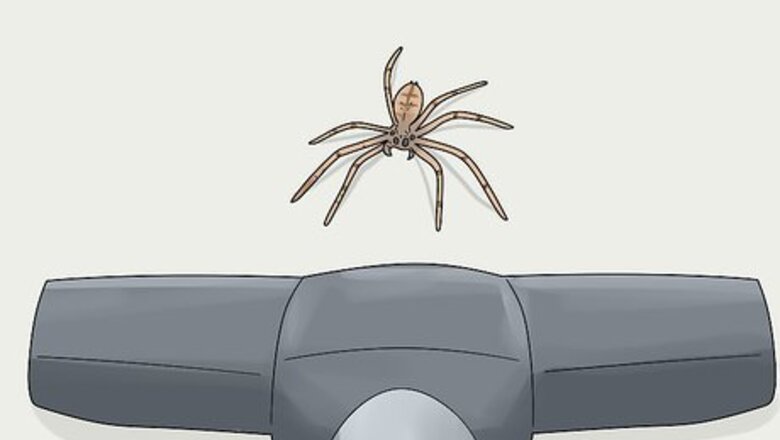
views
Eliminating Eight-Legged Pests
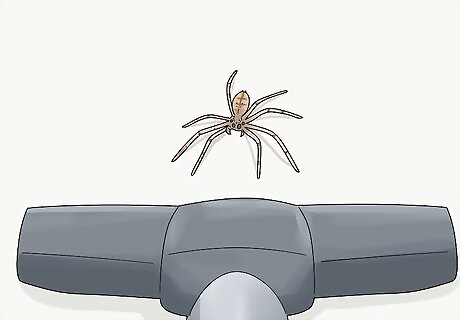
Vacuum the spider using a long-handled attachment. Get out your vacuum, plug it in, and set up the attachment. Stand as far away from the spider as you can while still managing to reach it with the vacuum. Turn the machine on and place the end of the attachment over the spider. Take a moment to vacuum any lingering web, too. The force of the suction should kill any spider you vacuum, but to be safe empty the vacuum canister in an outside bin. If the idea of doing so makes you squeamish, ask a friend to help.
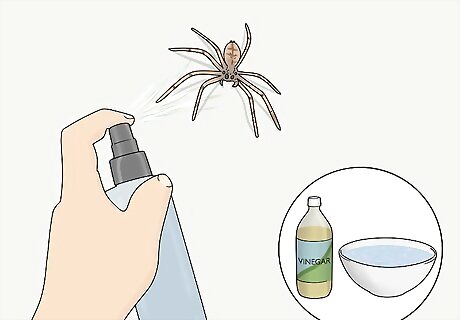
Spray the spider with a mix of white vinegar and water. Mix 1 cup (240 mL) of water and 1 cup (240 mL) of white vinegar in a spray bottle. Test how far the spray bottle reaches so you know how close you need to get. Spray the spider repeatedly until it stops moving. The acid in the vinegar will burn and kill the spider. Once the spider is dead, use a vacuum or dustpan and brush to sweep it up and throw it out. Wipe down the wall or area with a damp cloth to clean away the vinegar. You can also use a commercial pesticide spray made for killing spiders.
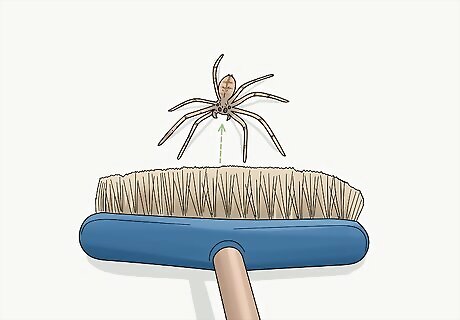
Smash the spider with the bristled end of a long-handled broom. Take the broom and push the end up against the spider while swiping downward. If the spider falls before you manage to smash it, you may have to smack it a few times with the broom to kill it. This method might be a little more panic-inducing because there is a chance you’ll simply knock the spider down but not kill it right away.
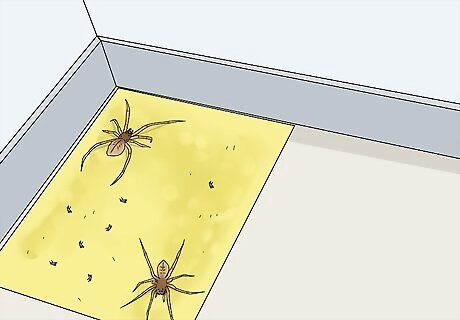
Place sticky traps around your home to catch spiders. This is a helpful option if you don’t mind waiting a few days to kill a spider. Set out a few traps in the corners of rooms where you’ve seen spiders. Check the traps every few days and throw them out once they’ve caught the spider or spiders. If you have children or pets, place the traps somewhere they won’t come into contact with them as the glue on some of them can be toxic.
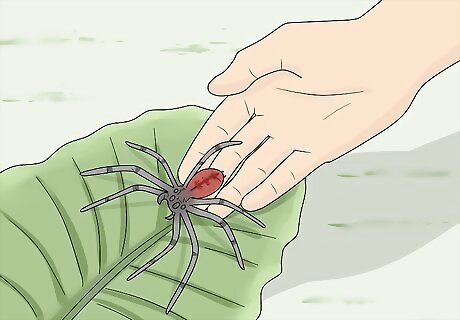
Consider leaving the spider alone or releasing it outdoors. Actual house spiders don’t pose a threat to humans and they can help keep your home free of other pests, like flies, moths, and earwigs. Catching it under a cup and taking it outside is a humane option if you can bring yourself to do it.Warning: If you suspect that the spider is a brown recluse or black widow, do not attempt to catch and release it. Kill it with an insecticide made specifically for spiders. If you suspect an infestation, contact a professional exterminator to deal with them.
Spider-Proofing Your Home
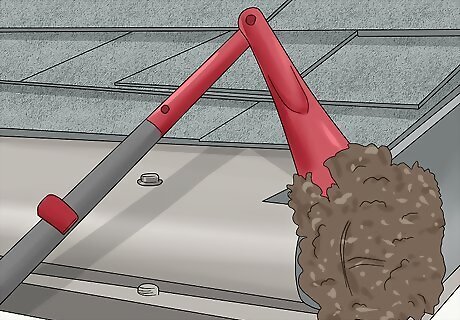
Keep gutters and hedges clean so they don’t attract spiders. Dark, damp places that attract other bugs are ideal homes for spiders, so take some time to clear out your gutters of fallen leaves and debris every few months. Similarly, clean up fallen leaves and foliage around the perimeter of your home. Spiders normally get into the home through cracks and crevices. Keeping the perimeter clean provides less incentive for them to find those cracks.Tip: Always wear sturdy work gloves while clearing out leaves and yard waste. If there are any spiders in there, the gloves should protect you from any potential bites.

Minimize how many outdoor lights you use. Spiders are attracted to light, especially at nighttime. They like to spin their webs in front of light sources so it’s easier for them to catch bugs that fly toward the light. Even just remembering to turn off outside lights when the sun starts to go down can help reduce the number of spiders on the outside of your home, making it less likely that they’ll find their way indoors. Use yellow or sodium vapor lights as an alternative to normal lightbulbs. They attract fewer bugs.
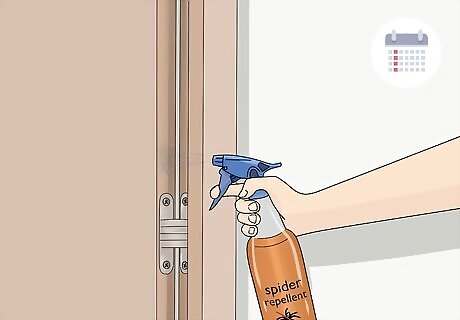
Spray the perimeter of your home with a spider repellent once a week. Use a store-bought product or make one yourself at home. For example, essential oils, like peppermint, can be mixed with water and dish soap and sprayed around windows and doors to help keep spiders at bay. Non-toxic sprays can be used indoors, too, for extra protection. Opt for a residual spray since it will remain effective on the surface for a longer period of time.
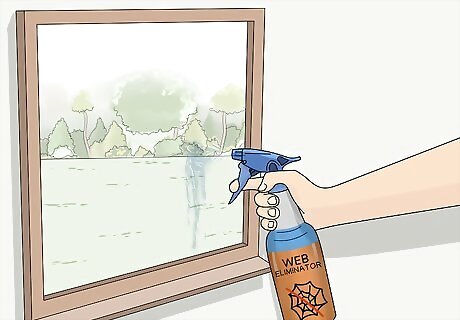
Use a web-eliminator spray around windows, baseboards, and doors. Web-eliminator sprays make it difficult for spiders to get their webs to stick to different surfaces. Focus the spray on areas where spiders are most likely to hang around, like windows and the corners of rooms. Most sprays will also break down any current webs in or outside your home, making them easier to clean up.
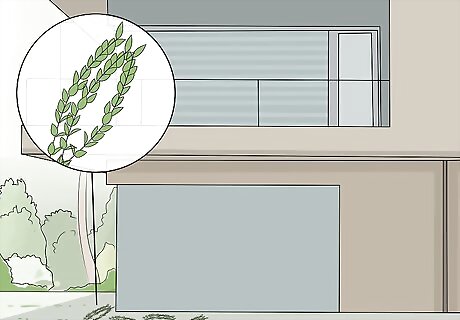
Place sprigs of eucalyptus around the outside of your home. Spiders are repelled by the scent of eucalyptus, but it won’t actually harm them. It also repels cockroaches, mosquitos, fleas, and flies, plus it is usually a pleasing smell to humans. You can buy fresh eucalyptus online or from local garden centers. You could even grow an herb garden outside your home or in a planter outside a window to repel spiders.
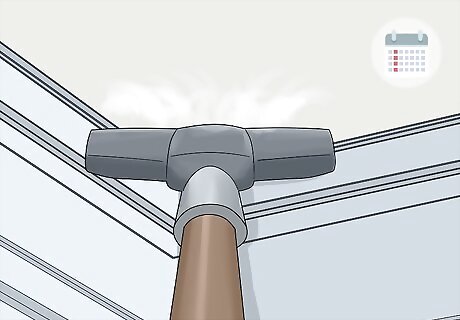
Vacuum your home, including the corners of the ceiling, every week. Keeping your home clean of cobwebs and other small bugs will provide less incentive for spiders to make their webs inside. Make sure to vacuum your baseboards, in the corners of each room, and in the corners of the windows and doors. If you don’t have time to vacuum every week, at least go around your home with a duster and clean out the corners.




















Comments
0 comment